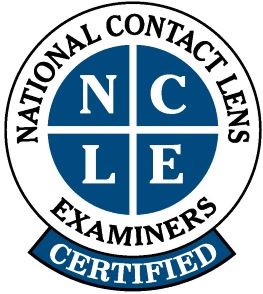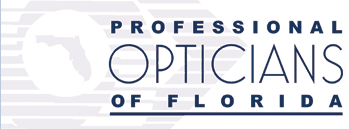ABO and NCLE are national not-for-profit organizations for the certification of ophthalmic dispensers. The State of Florida requires that individuals wanting to become licensed in the State successfully pass both of these certification exams in order to qualify to take the National Practical Exam.
 ABO, the American Board of Opticianry, certifies opticians – those who dispense and work with spectacles.
ABO, the American Board of Opticianry, certifies opticians – those who dispense and work with spectacles.
 NCLE, the National Contact Lens Examiners, certifies those opticians and ophthalmic dispensers who fit and work with contact lenses.
NCLE, the National Contact Lens Examiners, certifies those opticians and ophthalmic dispensers who fit and work with contact lenses.
Both organizations have the same purpose:
to identify qualified ophthalmic dispensers for the public and for the ophthalmic community by certifying those who pass the professionally developed examinations. They also encourage growth of optical skills though continuing education and approve continuing education programs for re-certification.
In Florida, one of the requirements to be eligible to sit for the National Optician Board Exam is to successfully complete the ABO and NCLE exams. Florida opticians are not required to maintain these voluntary certifications, which require renewal every three years and include a certification renewal fee and continuing education requirements that may be different than Florida’s continuing education requirements depending on your individual situation.
Although maintaining these certifications is voluntary, there are Florida opticians that choose to maintain their certification for numerous reasons, including maintaining the recognition of achievement, professional pride, or that it is easier to transfer their opticianry license to certain other states with an active certification.
Florida opticians are able to use one or both “Alternate Renewal Methods” of renewing their certification. Check the chart below to see how the renew requirements apply to you.
More on Basic Certification at ABO-NCLE.org
ABO and NCLE Advanced Certifications
ABO and NCLE Advanced Certifications focus specifically on the advanced level knowledge and skills needed for ophthalmic dispensing, that is providing spectacle, contact lens, and refraction services. This certification can also compliment JCAHPO certificate holders, who work in medical offices but have limited optical knowledge and skill. In fact, COT/COMT certification is one of the eligibility pathways to this new and exciting skill level.
The Advanced Certification designations, ABOC-AC and NCLE-AC, are earned only after a practitioner has attained several years experience, completes a prescribed curriculum of advanced education, and achieves a passing score on the rigorous examinations.
More on ABO & NCLE Advanced Certification
ABO Masters Program
The Master in Ophthalmic Optics certificate demonstrates to the public and colleagues that an individual has attained a superior level in ophthalmic dispensing. Any optician who is currently certified by the American Board of Opticianry and has passed the ABO Advanced Exam is eligible to enroll in this program.
Candidates are required to write a technical thesis of at least 2,000 words, which must then be reviewed and approved by the Masters Committee. Upon approval of the thesis by this Committee, the title of ABO Master (ABOM) is conferred.
Candidates have three years to complete the program.
Earning your Master certificate is an excellent way to promote professionalism in opticianry. ABO encourages all qualified opticians to become a part of this program of ophthalmic dispensing distinction.
More on ABO Masters Program

 ABO, the American Board of Opticianry, certifies opticians – those who dispense and work with spectacles.
ABO, the American Board of Opticianry, certifies opticians – those who dispense and work with spectacles. NCLE, the National Contact Lens Examiners, certifies those opticians and ophthalmic dispensers who fit and work with contact lenses.
NCLE, the National Contact Lens Examiners, certifies those opticians and ophthalmic dispensers who fit and work with contact lenses.